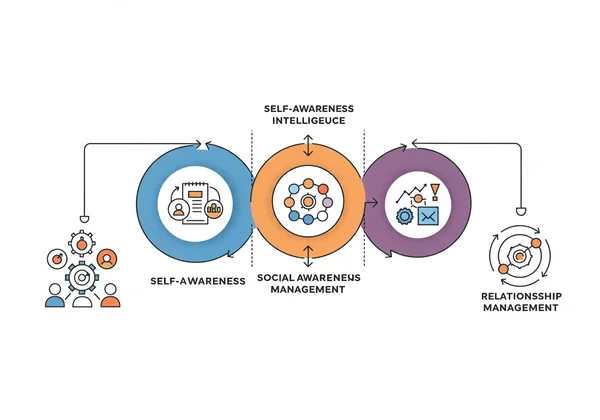10 Strategies to Improve Emotional Intelligence & Boost Your EI Test Score
October 8, 2025 | By Evelyn Reed
Have you ever wondered what separates good leaders from great ones, or why some people seem to navigate social situations with effortless grace? The answer often lies in emotional intelligence (EI). But here's the crucial question many self-improvers ask: How to improve emotional intelligence? Unlike IQ, which is relatively fixed, your emotional quotient (EQ) is a dynamic skill set that can be cultivated and strengthened over time. This guide is your roadmap to doing just that.
Improving your emotional intelligence is a journey of self-discovery that enhances your relationships, elevates your career, and deepens your understanding of yourself. It begins with a single step: understanding where you stand right now. To get a clear baseline of your current emotional strengths, you can take our EI test. This article will provide you with ten actionable strategies to help you grow from there.
Understanding the Pillars of EI for Effective Development
Before diving into specific techniques, it’s essential to understand the framework of emotional intelligence. Think of it as a structure built on four core pillars: Self-Awareness, Self-Management, Social Awareness, and Relationship Management. Every strategy to improve emotional intelligence strengthens one or more of these foundational areas, leading to holistic growth. A solid grasp of this structure makes your development efforts more targeted and effective.

Why Focus on EI Development? Benefits Beyond the Score
While getting a high score on an emotional intelligence test is a great goal, the true value lies in the real-world benefits. Developing your EI leads to reduced stress, as you learn to manage your emotional responses. It fosters more profound personal and professional relationships built on empathy and clear communication. In the workplace, high EI is linked to better leadership, teamwork, and decision-making, directly impacting career success and personal fulfillment.
Boosting Self-Awareness: The Foundation for EI Improvement
Everything starts with self-awareness. It is the ability to recognize and understand your own moods, emotions, and drives, as well as their effect on others. Without this cornerstone, meaningful growth in other areas is nearly impossible. It’s about tuning into your internal world with curiosity rather than judgment.
Practice Mindful Observation: Journaling & Reflection (Strategy 1)
One of the most powerful tools for building self-awareness is journaling. Set aside 5-10 minutes each day to write down your feelings without censorship. Ask yourself: What emotions did I experience today? What triggered them? How did I react? This practice of mindful observation transforms vague feelings into concrete data, helping you spot patterns you were previously unaware of.

Identify Your Emotional Triggers & Patterns (Strategy 2)
We all have emotional "hot buttons" that trigger disproportionate reactions. Self-awareness involves identifying these triggers. Pay attention to situations, people, or comments that consistently provoke a strong emotional response in you. By recognizing these patterns, you can move from a reactive state to a proactive one, choosing your response instead of letting your emotions take the driver's seat.
Mastering Self-Management & Emotional Regulation Skills
Once you can recognize your emotions, the next step is managing them. Self-management, or self-regulation, is about controlling or redirecting disruptive impulses and moods. It’s the ability to think before acting, stay calm under pressure, and maintain a positive outlook despite setbacks. These emotional regulation skills are critical for personal and professional stability.
Develop Effective Stress Regulation Techniques (Strategy 3)
Stress is inevitable, but your reaction to it is not. Find healthy coping mechanisms that work for you. This could be the 4-7-8 breathing technique (inhale for 4 seconds, hold for 7, exhale for 8), a short walk, listening to calming music, or practicing mindfulness. Having these tools ready allows you to de-escalate stress before it overwhelms you.

Cultivate Impulse Control & Emotional Agility (Strategy 4)
Have you ever said something in the heat of the moment you later regretted? Improving impulse control is about creating a pause between feeling an emotion and acting on it. A simple yet effective technique is the "six-second rule." When you feel a strong emotion, give yourself just six seconds before you respond. This brief interval is often enough for the initial emotional surge to subside, allowing your rational mind to engage.
Boost Motivation & Resilience (Strategy 5)
Self-management also fuels your internal drive. It involves aligning your actions with your long-term goals, even when motivation wanes. Practice breaking large goals into smaller, manageable steps to build momentum. Celebrate small victories to keep your motivation high. Resilience—the ability to bounce back from failure—is also a key component. Reframe setbacks as learning opportunities rather than personal failings.
Sharpening Social Awareness & Empathy Skills
Emotional intelligence extends beyond yourself to how you understand and interact with others. Social awareness is the ability to accurately read other people's emotions and understand their perspectives. It's the foundation of empathy, a critical skill for building strong, trusting relationships.
Master Active Listening for Deeper Understanding (Strategy 6)
Often, we listen to reply, not to understand. Active listening means giving the speaker your full attention. Put away your phone, make eye contact, and focus on their words, tone, and body language. Paraphrase what you heard ("So, what I'm hearing is...") to confirm your understanding and show them they are being heard. This simple shift can revolutionize your conversations.

Decode Non-Verbal Communication Cues (Strategy 7)
A significant portion of communication is non-verbal. Pay attention to body language, facial expressions, and tone of voice. Does someone's posture seem closed off even though their words are agreeable? Does their tone match their message? Learning to decode non-verbal communication cues gives you a richer, more accurate understanding of the emotional landscape of a conversation.
Cultivating Stronger Relationship Management for Success
The final pillar, relationship management, is where all the other skills come together. It’s about using your awareness of your own emotions and those of others to manage interactions successfully. This includes clear communication, conflict resolution, and inspiring others. It's the most visible aspect of emotional intelligence.
Practice Empathetic Communication & Assertiveness (Strategy 8)
Effective communication is both empathetic and assertive. Empathetic communication involves acknowledging and validating the other person's feelings, even if you don't agree with them. Assertiveness is about expressing your own needs and feelings clearly and respectfully. The goal is to find a balance where all parties feel heard and respected.
Navigate Conflict with Constructive Dialogue (Strategy 9)
Conflict is a natural part of any relationship. Those with high EI see conflict not as a battle to be won, but as a problem to be solved collaboratively. Approach disagreements with a focus on the issue, not the person. Use "I" statements ("I feel...") instead of "You" statements ("You always...") to avoid blame and foster constructive dialogue.
Build & Nurture Collaborative Connections (Strategy 10)
Strong relationships require ongoing effort. Take the initiative to check in with colleagues, friends, and family. Offer support, show appreciation, and be genuinely interested in their lives. By actively working to build & nurture collaborative connections, you create a strong support network that is essential for both personal well-being and professional success. Knowing your EI strengths can help you identify where to focus your efforts. Start with a free EI test online to see where you excel.
Your Journey to Higher EI: Take the Next Step with Our EI Test
Improving your emotional intelligence is one of the most rewarding investments you can make in yourself. These ten strategies provide a practical framework for growth, but the journey is unique to you. It requires patience, practice, and a willingness to be honest with yourself.
The first step is always awareness. Are you ready to discover your emotional strengths and identify areas for development? Get your personalized EI score on our homepage. Use it as your starting point, apply these strategies, and retake the test later to track your progress. Your journey to a higher EQ begins now.
Frequently Asked Questions About Improving Emotional Intelligence
What is a good EI score, and how can I track my improvement?
A "good" EI score is relative and best used as a personal benchmark. The real goal isn't to hit a specific number but to see growth over time. You can track improvement by taking a reliable EI assessment to establish a baseline. After consistently practicing the strategies in this article for a few months, take the test again to measure your progress.
How quickly can I expect to improve my emotional intelligence?
Improving EI is like building a muscle—it takes time and consistent effort. While you might notice small changes in your awareness and reactions within weeks, significant, lasting improvement typically takes several months of dedicated practice. Be patient with yourself and focus on incremental progress rather than overnight transformation.
Are people with higher EQ generally more successful in life and career?
Research overwhelmingly suggests a strong correlation between high EQ and success. People with higher emotional intelligence tend to have better leadership abilities, stronger relationships, greater job satisfaction, and improved mental well-being. While it's not the only factor, a well-developed EQ provides a significant advantage in nearly every aspect of life.
What are the 4 pillars of emotional intelligence discussed in these strategies?
The four pillars are the foundational components of emotional intelligence. They are:
- Self-Awareness: Understanding your own emotions and their impact.
- Self-Management: Controlling your emotional responses and impulses.
- Social Awareness: Perceiving and understanding the emotions of others (empathy).
- Relationship Management: Using emotional awareness to build and maintain healthy relationships.